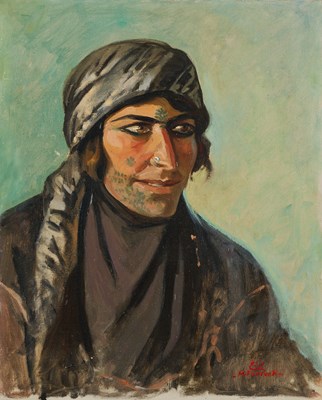1st May, 2024 12:00
Modern and Contemporary African and Middle Eastern Art
73
‡ MUSTAPHA FARROUKH (LEBANESE 1901-1957)
BASSARA
signed in English and Arabic - M. Farroukh - lower right
oil on canvas
50 x 40cm; 19.6 x 15.7in
54 x 45cm; 21 1/4 x 17 3/4in (framed)
Painted in 1945
Property from a Private Collection, London
Provenance
Agial Art Gallery, Beirut, 2012
Moustafa Farroukh was formally trained in Rome and graduated from Accademia di Belle Arti. He proceeded to Paris and continued further studies under the guidance of Paul Emile Chabas, the president of the Society of French Artists. During his successful but short career, he exhibited in Paris, Venice, New York and Beirut. In his studio in Beirut, he established a permanent exhibition of his work. Farroukh travelled through Spain in the early 1930s where his appreciation of Arabic art and architecture had a long-lasting effect on his artistic touch.
Farroukh became highly regarded as a Lebanese national painter at a time when Lebanon was asserting its political independence. His work was applauded for its representation of real life in Lebanon through pictures of the country, its people and its customs, capturing their spirit and character.
Farroukh wrote five books and taught art at the American University of Beirut and lectured in various academies. He joined the group of philosophers, thinkers, and literati who lectured in the renowned Al Nadwa gatherings or Le Cénacle Libanais. In 1954, he was awarded the 'Order of Merit', and the 'Order of the Cedar' by the Lebanese government. In 1974, he was featured posthumously on a Lebanese airmail postage stamp in recognition of his work.
Sold for £1,800
BASSARA
signed in English and Arabic - M. Farroukh - lower right
oil on canvas
50 x 40cm; 19.6 x 15.7in
54 x 45cm; 21 1/4 x 17 3/4in (framed)
Painted in 1945
Property from a Private Collection, London
Provenance
Agial Art Gallery, Beirut, 2012
Moustafa Farroukh was formally trained in Rome and graduated from Accademia di Belle Arti. He proceeded to Paris and continued further studies under the guidance of Paul Emile Chabas, the president of the Society of French Artists. During his successful but short career, he exhibited in Paris, Venice, New York and Beirut. In his studio in Beirut, he established a permanent exhibition of his work. Farroukh travelled through Spain in the early 1930s where his appreciation of Arabic art and architecture had a long-lasting effect on his artistic touch.
Farroukh became highly regarded as a Lebanese national painter at a time when Lebanon was asserting its political independence. His work was applauded for its representation of real life in Lebanon through pictures of the country, its people and its customs, capturing their spirit and character.
Farroukh wrote five books and taught art at the American University of Beirut and lectured in various academies. He joined the group of philosophers, thinkers, and literati who lectured in the renowned Al Nadwa gatherings or Le Cénacle Libanais. In 1954, he was awarded the 'Order of Merit', and the 'Order of the Cedar' by the Lebanese government. In 1974, he was featured posthumously on a Lebanese airmail postage stamp in recognition of his work.
Auction: Modern and Contemporary African and Middle Eastern Art, 1st May, 2024
Viewing
PUBLIC EXHIBITION
Sunday 28th April 12:00pm - 4:00pm
Monday 29th April 10:00am - 8:00pm
Tuesday 30th April 10:00am - 5:00pm




